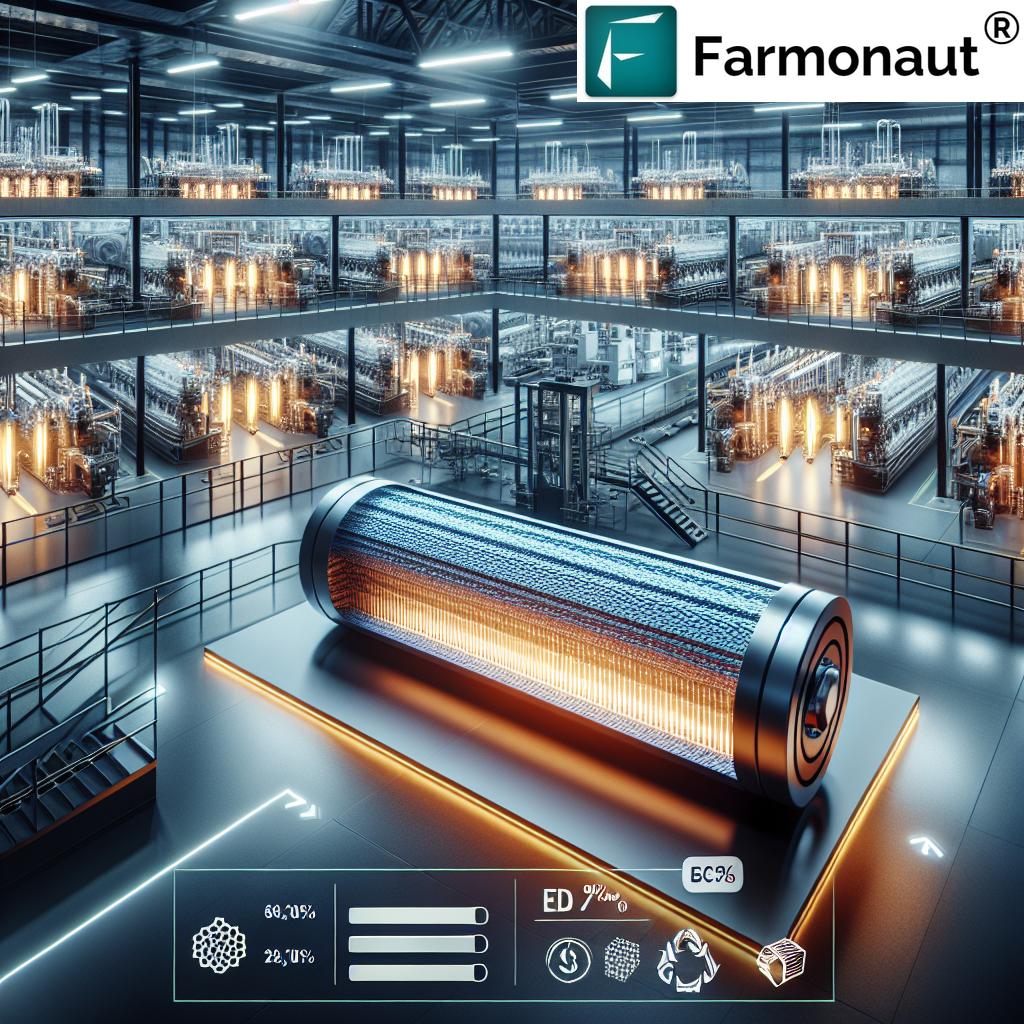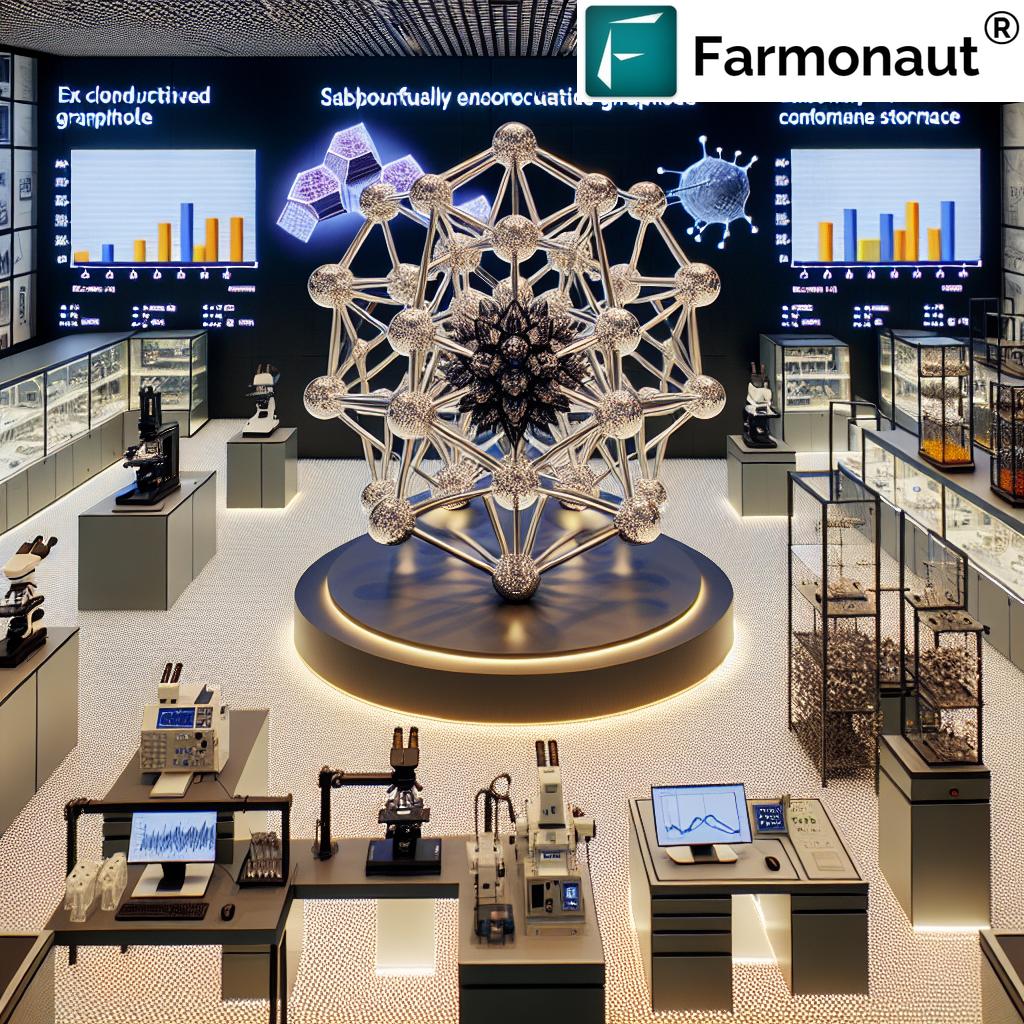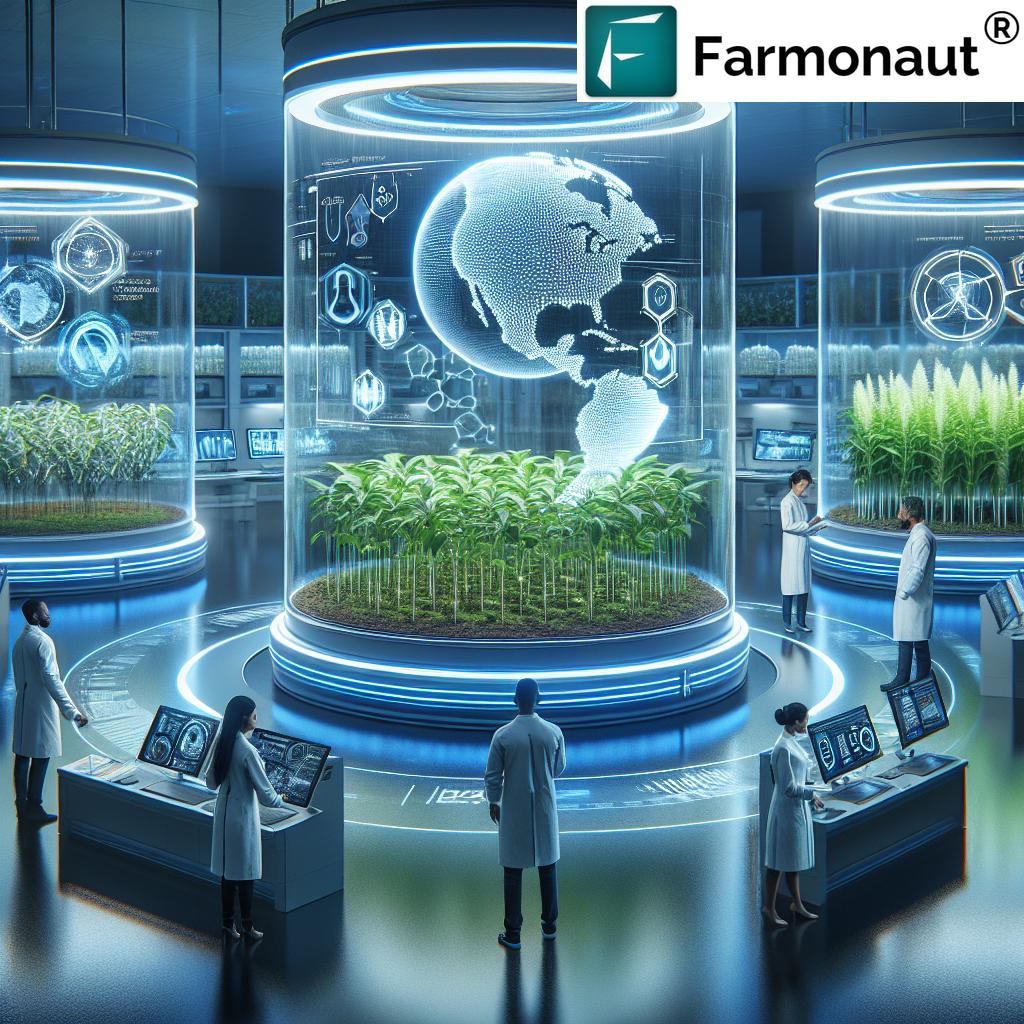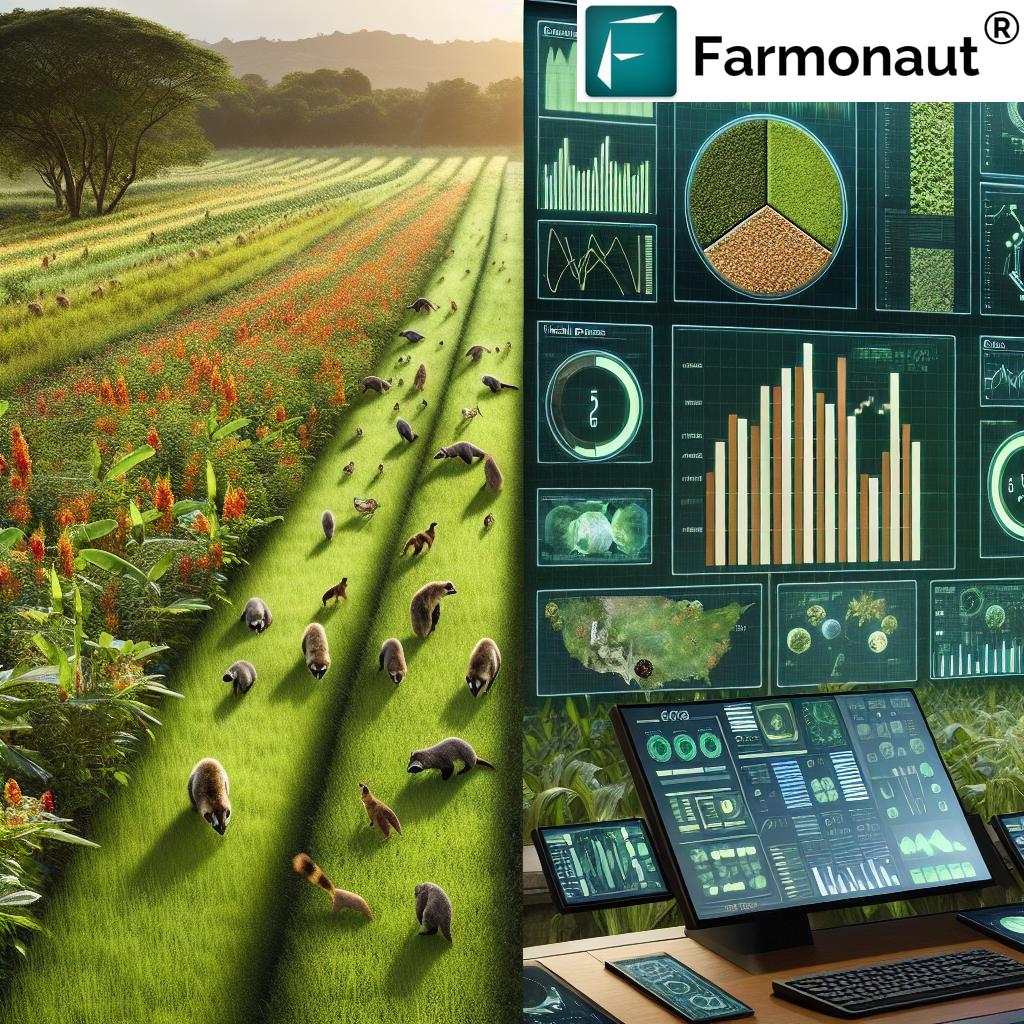Revolutionizing Battery Technology: Farmonaut’s Insights on Advanced Synthetic Graphite Production in Tennessee
“The new synthetic graphite production agreement in Tennessee could revolutionize the $94 billion global lithium-ion battery industry.”
At Farmonaut, we’re excited to share our insights on a groundbreaking development in the world of battery technology. As pioneers in agricultural technology, we understand the importance of innovation and its potential to transform industries. Today, we’re turning our attention to a significant advancement in the energy sector that promises to reshape the future of battery materials and sustainable energy solutions.
The Dawn of a New Era in Battery Materials
The recent announcement of a revolutionary licensing agreement for synthetic graphite production marks a pivotal moment in the lithium-ion battery industry. This exclusive partnership grants rights to utilize innovative graphitization furnace technology, paving the way for advanced energy storage solutions. As experts in leveraging cutting-edge technology for agricultural advancements, we at Farmonaut recognize the immense potential this development holds for the energy sector.

The Partnership: NOVONIX and Harper International
At the heart of this breakthrough is the collaboration between NOVONIX Limited, a prominent battery materials and technology company based in Brisbane, Australia, and Harper International Corporation. This strategic partnership aims to enhance high-performance battery materials production, supporting the growing demand for electric vehicle battery innovations.
The licensing agreement allows NOVONIX exclusive rights to Harper’s continuous, induction-based graphitization furnace technology. This technology is crucial for producing synthetic graphite anode material, a key component in lithium-ion batteries.
The Technology Behind the Revolution
The innovative graphitization furnace technology at the center of this agreement represents a significant leap forward in battery materials production. Here’s why it’s so important:
- Enhanced Efficiency: The continuous, induction-based process promises to streamline synthetic graphite production, potentially reducing energy consumption and production time.
- Improved Quality: This advanced technology may lead to higher quality synthetic graphite, which could translate to better performing batteries.
- Scalability: The new process is designed with large-scale production in mind, crucial for meeting the growing demand in the electric vehicle and energy storage markets.
“Advanced graphitization furnace technology may increase synthetic graphite anode material production efficiency by up to 30%.”
The Riverside Facility: A Game-Changer in Tennessee
NOVONIX’s Riverside facility in Chattanooga, Tennessee, is set to become a landmark in the battery materials industry. Here’s what makes it special:
- It’s poised to be the first large-scale manufacturing site for high-performance synthetic graphite in North America.
- The facility aims to reach an output of 20,000 tonnes per annum to fulfill existing customer commitments.
- Commercial production is scheduled to begin later this year, marking a significant milestone in domestic battery material production.
This development aligns perfectly with the growing trend of localizing critical supply chains, a strategy we at Farmonaut strongly support in the agricultural sector through our satellite-based farm management solutions.
Government Support and Financial Backing
The U.S. Department of Energy (DOE) has shown strong support for this initiative, underlining the project’s importance to national energy strategy:
- A $100 million grant awarded to NOVONIX
- A $103 million investment tax credit
- A conditional commitment for a loan of up to $754.8 million to finance a new production facility called NOVONIX Enterprise South in Chattanooga
This level of government backing highlights the critical nature of advanced battery materials in the broader context of clean energy technology advancements. It’s reminiscent of the support we’ve seen for agricultural technology innovations, which have been crucial in advancing sustainable farming practices.
The Impact on Battery Performance and Sustainability
The advancements in synthetic graphite production are expected to have far-reaching effects on battery performance and sustainability. Let’s break down the potential impacts:
| Feature | Traditional Graphite | Advanced Synthetic Graphite | Impact on Battery Performance |
|---|---|---|---|
| Production Process | Energy-intensive, often with environmental concerns | Optimized, continuous process with lower energy requirements | More sustainable production, potentially lower costs |
| Energy Density | Standard | Estimated 20% increase | Longer battery life, extended range for EVs |
| Charging Speed | Standard | Potential for 30% faster charging | Reduced charging times, improved user experience |
| Cycle Life | Standard | Potentially improved by 25% | Longer-lasting batteries, reduced replacement needs |
| Environmental Impact | Variable, often significant | Reduced carbon footprint due to optimized production | More environmentally friendly batteries, aligning with sustainability goals |
These improvements in battery technology resonate with our mission at Farmonaut to enhance efficiency and sustainability in agriculture. Just as our satellite and AI-driven solutions help farmers optimize resource use, these battery advancements will contribute to more efficient energy storage and utilization.
The Future of Synthetic Graphite Production
The licensing agreement between NOVONIX and Harper International sets the stage for rapid advancements in synthetic graphite production. Key aspects of this future include:
- Technological Evolution: The agreement allows NOVONIX to further develop the technology, potentially leading to even more efficient and effective production methods.
- Scalability: As performance benchmarks are met and additional licensing fees are paid, NOVONIX will have the ability to build their own equipment using the licensed technology.
- Potential for Industry-Wide Impact: The exclusivity period of up to seven years provides NOVONIX with a significant advantage, but also sets a new standard for the industry to aspire to.
This forward-thinking approach to technology development and licensing mirrors our own strategies at Farmonaut, where we continuously evolve our API and developer tools to stay at the forefront of agricultural technology.
Implications for the Electric Vehicle Industry
The advancements in synthetic graphite production are set to have a profound impact on the electric vehicle (EV) industry:
- Enhanced Battery Performance: Improved energy density and faster charging times could lead to EVs with longer ranges and shorter charging stops.
- Cost Reduction: More efficient production methods may eventually translate to lower battery costs, making EVs more affordable for consumers.
- Accelerated Adoption: As battery technology improves, we may see an acceleration in the transition from traditional combustion engines to electric vehicles.
This shift towards more efficient and sustainable transportation aligns with global efforts to reduce carbon emissions, a goal that resonates with our mission at Farmonaut to promote sustainable agricultural practices.
The Role of Innovation in Sustainable Energy Solutions
The development of advanced synthetic graphite production technology is a testament to the power of innovation in driving sustainable energy solutions. At Farmonaut, we understand the importance of innovation in addressing global challenges, whether it’s in agriculture or energy production.
Key aspects of this innovative approach include:
- Research and Development: Continuous investment in R&D is crucial for pushing the boundaries of what’s possible in battery technology.
- Collaboration: The partnership between NOVONIX and Harper International demonstrates the value of combining expertise to achieve breakthroughs.
- Sustainability Focus: The emphasis on developing more environmentally friendly production processes aligns with global sustainability goals.
These principles of innovation and sustainability are at the core of our work at Farmonaut, where we leverage advanced technologies like satellite imaging and AI to promote sustainable farming practices. Learn more about our innovative approach through our Android app and iOS app.

The Global Impact of Advanced Battery Materials
The development of advanced synthetic graphite production in Tennessee has implications that extend far beyond the United States:
- Global Supply Chains: This advancement could reshape global supply chains for battery materials, potentially reducing dependence on traditional sources.
- International Competitiveness: The technology gives the U.S. a competitive edge in the global battery materials market.
- Environmental Benefits: More efficient and cleaner production methods contribute to global efforts to reduce carbon emissions.
This global perspective on technology and sustainability resonates with our approach at Farmonaut, where we aim to make precision agriculture accessible to farmers worldwide through our innovative satellite-based solutions.
Challenges and Considerations
While the advancements in synthetic graphite production are promising, it’s important to consider potential challenges:
- Scaling Production: Ramping up to large-scale production while maintaining quality and efficiency will be crucial.
- Market Adoption: The success of this technology will depend on its adoption by battery manufacturers and EV producers.
- Regulatory Landscape: Evolving regulations in the battery and EV industries could impact the implementation of new technologies.
- Competition: Other companies and countries are also investing heavily in battery technology, creating a competitive landscape.
These challenges remind us of the complexities involved in introducing new technologies, something we’re familiar with at Farmonaut as we continually evolve our agricultural technology offerings.
The Road Ahead: Future Prospects and Developments
As we look to the future of battery technology and synthetic graphite production, several exciting prospects emerge:
- Continued Innovation: The exclusive license granted to NOVONIX for up to seven years provides a runway for further technological advancements.
- Potential for New Applications: Improved battery materials could open up new possibilities in energy storage beyond EVs, including grid storage and portable electronics.
- Economic Impact: The growth of this industry could create new jobs and economic opportunities, particularly in regions like Tennessee where production facilities are being established.
- Environmental Progress: As battery technology improves, we may see accelerated adoption of clean energy technologies, contributing to global sustainability goals.
This forward-looking approach to technology and sustainability aligns closely with our vision at Farmonaut, where we continuously strive to develop new solutions that benefit farmers and the environment.
Conclusion: A Brighter, More Sustainable Future
The advancements in synthetic graphite production in Tennessee represent a significant leap forward in battery technology. This development promises to enhance energy storage solutions, support the growth of electric vehicles, and contribute to a more sustainable energy landscape.
At Farmonaut, we’re inspired by these technological breakthroughs and their potential to drive positive change. Just as we leverage satellite technology and AI to revolutionize agriculture, these advancements in battery materials are set to transform the energy sector.
As we continue to monitor these exciting developments, we remain committed to our mission of making precision agriculture affordable and accessible to farmers worldwide. We believe that by embracing innovation and sustainability across all sectors, we can create a brighter, more sustainable future for all.
To learn more about how Farmonaut is contributing to sustainable agriculture through technology, visit our website and explore our range of solutions.
Frequently Asked Questions
- What is synthetic graphite and why is it important for batteries?
Synthetic graphite is a manufactured form of carbon used in battery anodes. It’s crucial for lithium-ion batteries because it provides high energy density, long cycle life, and fast charging capabilities. - How does the new graphitization furnace technology improve synthetic graphite production?
The new technology uses a continuous, induction-based process that is more efficient and potentially cleaner than traditional methods. It may lead to higher quality graphite and increased production capacity. - What impact will this development have on electric vehicles?
Improved synthetic graphite production could lead to batteries with higher energy density, faster charging times, and potentially lower costs, all of which could accelerate EV adoption. - How does this technology contribute to sustainability?
The new production method is designed to be more energy-efficient and environmentally friendly, potentially reducing the carbon footprint of battery production. - What role does government support play in this development?
Government support, through grants and loans, is crucial in scaling up new technologies and ensuring domestic production capabilities for critical battery materials.
Earn With Farmonaut: Affiliate Program
Earn 20% recurring commission with Farmonaut’s affiliate program by sharing your promo code and helping farmers save 10%. Onboard 10 Elite farmers monthly to earn a minimum of $148,000 annually—start now and grow your income!












